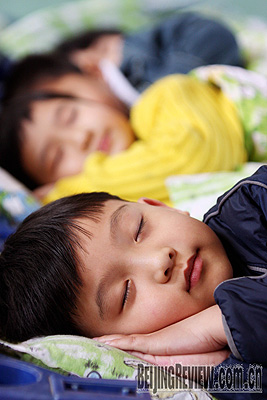| Thirty-year-old Wang Jian, a development engineer at a Beijing fuel-cell company, used to sleep like a baby. Nowadays, though, he wakes up early every morning. His mind fixes on the latest product he is working on and he cannot go back to sleep. When Wang complained about his insomnia at a weekend get-together of former university classmates, he found it was a common problem among his engineer friends. One, a long-time insomnia sufferer, even recommended Wang try a certain medicine.
 |
|
REMEMBER SLEEPING WELL: Kindergarteners take their afternoon nap in Shandong Province's Jinan City. Noontime naps are a luxury for a large number of adults (ZHU ZHENG) | Wang and his friends are only part of a growing legion of Chinese professionals falling prey to pressure-induced insomnia that causes insufficient and low-quality sleep, according to a Chinese sleep survey released on the eve of March 21's World Sleep Day.
Zheng Xiaohua, a Changchun-based psychiatrist, told New Culture View newspaper that fierce competition in various sectors of modern society constantly puts people in high-intensity, stressful situations, which makes them particularly vulnerable to insomnia. In a survey conducted by the psychiatric institute where Zheng works, about half of the respondents suffered from insufficient sleep and a shocking 80 percent of female professionals say they do not get quality sleep. Two thirds of the survey's respondents were female. The survey also indicated that retirees and white-collar workers are the two largest groups that develop insomnia.
Zheng said insufficient sleep can result in fatigue, depression, dizziness, irregular heartbeat and other problems. Symptoms of chronic insomnia, meanwhile, may include reduced immunity, decreased appetite, headaches, ringing in the ears and even schizophrenia. The survey showed that only half of insomnia patients visited a doctor while the other half either received no medical treatment or self-medicated.
A March online sleep-quality survey conducted by Renmin Hospital of Wuhan University and Chutian Metropolis Daily attracted over 20,000 netizens, mainly between the ages of 18 and 35. More than half the respondents said they "go to sleep late and get up early" while 40 percent said they would take a nap at noon if they could. More than 40 percent of respondents said they suffer from headaches and difficulty concentrating while about 30 percent suffer from depression, anxiety and irritability. Even with those numbers feeling bad from lack of sleep, a hefty 89 percent said they have never gone to a doctor for sleeping problems. Nearly half the participants blamed their sleeplessness on too many errands while 35 percent blamed their irregular work schedules.
|
